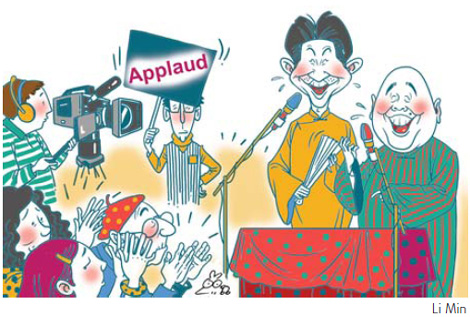If you have to teach humor it's not funny

Admission into the Beijing Film Academy is often viewed as a sure-fire way of becoming a celebrity because of the many movie queens and kings it has minted. But can it produce a cross-talk (xiangsheng) star?
For the first time, the academy is recruiting students to major in cross-talking (basically, stand-up comedy) and comedy performance. In four years, those who graduate from this class will be the first cross-talkers ever to have bachelors' degrees in the subject.
The issue has become a hot topic because usually cross-talk performers are not well educated. For example, 37-year-old cross-talker Guo Degang didn't even complete junior high school, which is part of the nine-year compulsory education in China.
So, many are asking, is college education necessary for cross-talk performers?
Since the 19th century, when cross-talk first appeared, its practitioners have been carrying on a master-apprentice form of education. Often, an apprentice studied with the master for three years and one season, during which time the apprentice was supported by the master, but all the income from the apprentice's performances went to the master.
For more than 100 years, this system was effective, as shown by the numerous great cross-talk comedians that have emerged from it. But today the system works only nominally. Although most performers still have their names associated with a master, no one is studying for three years and a season before beginning their career.
The old system not only provided training to new performers, but also served to keep outsiders away and protect insiders, like a guild. In the old days, when cross-talk was mostly performed in teahouses and small theaters, usually owned by members, only those in the system would get opportunities.
Since TV has become the most popular mass medium, opportunities are no longer just in the hands of cross-talk masters, but are controlled by directors of TV variety shows, where the CCTV Spring Festival Gala sits at the apex.
For the past few decades, a cross-talk performer has had to be part of the TV circuit to become famous. A position in an official art troupe might help. Art colleges like Beijing Film Academy are in this chain, for they can offer the connections needed to enter the TV circle and official art troupes.
This does not necessarily mean they will be turning out great cross-talkers. Nine years ago, the Central Academy of Drama and National Academy of Chinese Theater Arts started recruiting students for cross-talk, as part of a two-year junior college diploma - but both stopped two years later. Few of those 100 or so graduates have become acclaimed performers, although many of them joined official art troupes and have opportunities to appear on TV.
At the end of the day, what makes a great comedian is talent, or humor. From this point of view, education can only provide limited help. The most important training comes from performing.
In the old days cross-talk audiences were tough. Only good comedians could make the audiences stay, while mediocre performers would find the theater empty as soon as they went onto the stage. This cruel but efficient system only enabled the best to survive.
In the TV-centered system the audience can't walk out and is merely told to applaud when the director says so. When I watched the CCTV Spring Festival Gala cross-talk performances, I almost forgot that they were supposed to be funny. I'm sure that if they appeared at Guo Degang's theater everyone would have walked out.
Fortunately, there has been a revival of live cross-talk in recent years. Some people are indignant the CCTV Spring Festival Gala has never invited Guo to appear, but I'm glad. Let mediocre performers do their TV skits, until one day nobody bothers to watch them.
 0
0 







Go to Forum >>0 Comments